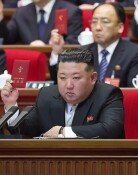Interview with former MOCIE minister
Interview with former MOCIE minister
Posted November. 13, 2000 14:39,
Early this year, when the nation¡¯s sentiment was that the foreign exchange crisis was over and venture fever was in the air, Minister of Commerce, Industry and Energy Kim Young-Ho consistently warned that the crisis was yet to end, thus embarrassing both the government and the ruling party.
Unfortunately, his prediction seems correct considering the current economic situation. In a recent interview with Kim, an economist who was sacked with last August's cabinet reshuffle, suggested some solution to the current crisis.
Q: It seems that your warning is likely to be actualized. What do you think?
A: I think so. From 2001, the economic situation could be jeopardized with slow growth, high prices, trade deficit and capital flight. The future of the nation's economy might be decided within the next 2-3 years. If something is wrong, Korea might become like countries such as Mexico and others in Central and South America that are suffering from chronic economic trouble, or fall in a long-term slump like Japan. It is urgent to reverse the W-type economic crisis.
Q: Why is it a crisis?
A: The trade surplus during the past three years is abnormal. Under the IMF control, companies refrained from investing in facilities and technology development, and they just exported goods with belt-tightening management policy. On the other hand, imports shrank abnormally. As a result, Korea enjoyed a trade surplus.
It is necessary to examine the profitability of exports since 1995. It has been sliding ever since. The high oil prices are just shortening the advent of the upcoming crisis. Wall Street is watching Korea's restructuring. Foreign ownership in Korean companies averages 30%, and it exceeds 50% in companies of core businesses such as semiconductors. If only 2% of their stock holdings are withdrawn from the market, it would hit the Korean stock market. Can you imagine what will happen if 10% is withdrawn from the market?
If Korea fails now, it would create a critical situation. In particular, Korea could face even more severe circumstances if the U.S. economy is heading to soft landing.
Q: What's wrong with the government policy?
A: During the early days since the out break of the crisis, the government emphasized tight-money policy and high interest rates as well as debtor's obligation such as BIS regulations. In fact, the government did well under the given circumstances.
However, the government has made a series of mistakes thereafter. The first mistake was to declare graduation of so-called control by the IMF. Even though Korea has overcome the primary crisis, domestic financial crisis and overall economic crisis was yet to over. The government's declaration of overcoming the foreign exchange crisis relaxed the overall feeling of social crisis and enhanced the expectation of the nation. Also, it was a mistake that some economic ministers say that the Korean economy has entered into the ¡°new economy.¡±
The second mistake was the economy-boosting measure during the second half of 1999. We had to face the winter while building up our strength and wait for the spring. Yet the government has artificially created the spring, thus inviting even severe winter.
Q: How would you comment about the latest corporate restructuring?
A: Despite mounting criticism, it must have been difficult to carry forward the restructuring. Just like insolvent companies, insolvent financing and poor policies are the problem. Companies hardly can regain their competitiveness if corporate restructuring is left to the hands of insolvent financial institutions that are suffering from the lack of capital adequacy ratio.
Banks are facing difficulties with their own problems. The government pours enormous amounts of public funds into corporations and put them into workout or court receivership. However, it failed to revive them, and now they are to be liquidated. It means that the government policy has failed. Now, it is necessary to work out a precise and professional strategy. It is time that the government needs to undergo a massive restructuring.
Q: Are you talking about reform of the public sector?
A: I am not talking about privatization of Korea Electric Power or Pohang Iron & Steel. I'm talking about reform of the government system. It is a problem that there exists a strategic gap between the president's vision and administrative dash of the bureaucrats. I have a feeling that the chaos of a nation with no strategy is at a serious level. It is urgent to rearm the government morally, strategically and systematically to link the engine of reform with the engine of growth.
It is necessary to perform an impressive political renovation more than just pain sharing in order to achieve the enormous work of linking crisis overcoming with entry into advanced countries. However, even pain sharing is not properly executed at the moment.
Q: What are the strategies that government needs?
A: I would like to stress three strategies.
First, finance-based policy needs to be changed into a strategy for both finance and industries. It means creditors and corporations would have to seek a win-win strategy. Under the current restructuring approach, it is highly likely those companies that might survive could be killed while keeping those hopeless companies. It is too late to think about industries after completion of restructuring.
Second, corporate liquidation and creation of new companies have to be carried forward at the same time. Currently, domestic banks do not have a financial system to create new companies. It seems that the government expects foreign investors to absorb those who became jobless as a result of massive corporate liquidation. In the meantime, the government might try to soothe them through a welfare program.
Right now, the foreign corporations that are trying to build operations in Korea mostly are engaged in information technology or financial institutions, but the unemployed people are mostly from companies of the old economy. It is necessary to adopt a strategy to double the number of 21st century-oriengted new companies.
Finally, it is necessary to build a system to innovate productivity and labor-management cooperation. It is something that the political circle has to take care of.
Lee Byong-Ki eye@donga.com







